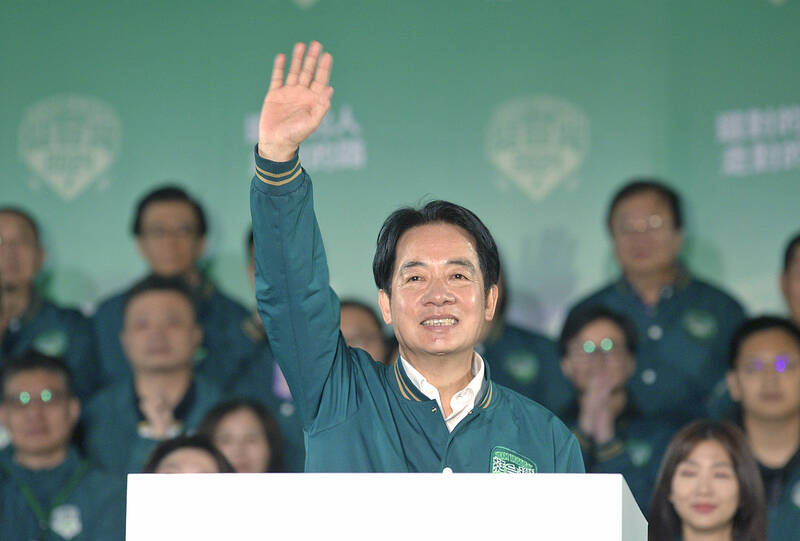President-elect William Lai’s (賴清德) inaugural address tomorrow would emphasize solidarity, steadfastness, confidence and responsibility as the themes of his administration, an incoming senior security official said yesterday.
Lai, who succeeds President Tsai Ing-wen (蔡英文) after having been her vice president for the past four years, would have to deal with a China that has ramped up pressure on Taiwan — with almost daily military incursions near its airspace.
His inaugural address would sum up his vision for defending the nation’s democracy, peace and prosperity, said the official, who asked to remain anonymous.

Photo: Chiang Ying-ying, AP
Lai would underscore continuity with Tsai’s policy of raising the nation’s profile in the international community by contributing to overcoming global challenges, the official said.
The speech would recognize that political partisanship is likely to become persistent and would compound the dangers posed by Beijing’s relentless campaign of coercion toward Taiwan’s national sovereignty, they said.
Lai would emphasize the importance of solidarity in countering Beijing’s efforts to sow division and strife, and that the government would uphold policies supported by national consensus and focus on improving Taiwan, they said.
The incoming administration’s policymaking, as encapsulated in Lai’s “National Project of Hope” policy blueprints, would be directed at realizing the principles of democracy, peace and public good, they said.
Steadfastness would underline the administration’s desire to continue with the foundations laid by Tsai, aimed at transforming the nation into an indispensable agent of stability in regional security and the global economy, they said.
Lai’s theme of confidence refers to staying the course on the policy of developing resilience and innovation, and realizing the Taiwanese values of hard work, kindness and generosity in dealing with the world, they said.
The president-elect would assure the nation of his willingness to be accountable to Taiwanese and direct the government to act as a responsible member of the international community, they said.
He would say that Taiwan must contribute to solving global challenges in solidarity with the world and conduct its affairs with dignity, they said.
Lai also faces major domestic challenges after his Democratic Progressive Party lost its legislative majority in January’s elections.
Asked to elaborate on Lai’s strategy to deal with division and partisanship in government, the source said the president-elect would be diligent in communicating with the public on matters of state.
The administration has faith in the principle that Taiwanese know that their destinies are bound together and that individual survival is found in common security, they said.
Additional reporting by Reuters

ENDEAVOR MANTA: The ship is programmed to automatically return to its designated home port and would self-destruct if seized by another party The Endeavor Manta, Taiwan’s first military-specification uncrewed surface vehicle (USV) tailor-made to operate in the Taiwan Strait in a bid to bolster the nation’s asymmetric combat capabilities made its first appearance at Kaohsiung’s Singda Harbor yesterday. Taking inspiration from Ukraine’s navy, which is using USVs to force Russia’s Black Sea fleet to take shelter within its own ports, CSBC Taiwan (台灣國際造船) established a research and development unit on USVs last year, CSBC chairman Huang Cheng-hung (黃正弘) said. With the exception of the satellite guidance system and the outboard motors — which were purchased from foreign companies that were not affiliated with Chinese-funded

PERMIT REVOKED: The influencer at a news conference said the National Immigration Agency was infringing on human rights and persecuting Chinese spouses Chinese influencer “Yaya in Taiwan” (亞亞在台灣) yesterday evening voluntarily left Taiwan, despite saying yesterday morning that she had “no intention” of leaving after her residence permit was revoked over her comments on Taiwan being “unified” with China by military force. The Ministry of the Interior yesterday had said that it could forcibly deport the influencer at midnight, but was considering taking a more flexible approach and beginning procedures this morning. The influencer, whose given name is Liu Zhenya (劉振亞), departed on a 8:45pm flight from Taipei International Airport (Songshan airport) to Fuzhou, China. Liu held a news conference at the airport at 7pm,

Taiwan was ranked the fourth-safest country in the world with a score of 82.9, trailing only Andorra, the United Arab Emirates and Qatar in Numbeo’s Safety Index by Country report. Taiwan’s score improved by 0.1 points compared with last year’s mid-year report, which had Taiwan fourth with a score of 82.8. However, both scores were lower than in last year’s first review, when Taiwan scored 83.3, and are a long way from when Taiwan was named the second-safest country in the world in 2021, scoring 84.8. Taiwan ranked higher than Singapore in ninth with a score of 77.4 and Japan in 10th with

GRIDLOCK: The National Fire Agency’s Special Search and Rescue team is on standby to travel to the countries to help out with the rescue effort A powerful earthquake rocked Myanmar and neighboring Thailand yesterday, killing at least three people in Bangkok and burying dozens when a high-rise building under construction collapsed. Footage shared on social media from Myanmar’s second-largest city showed widespread destruction, raising fears that many were trapped under the rubble or killed. The magnitude 7.7 earthquake, with an epicenter near Mandalay in Myanmar, struck at midday and was followed by a strong magnitude 6.4 aftershock. The extent of death, injury and destruction — especially in Myanmar, which is embroiled in a civil war and where information is tightly controlled at the best of times —